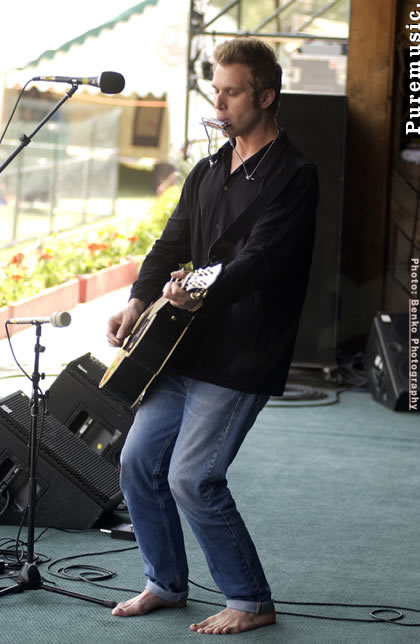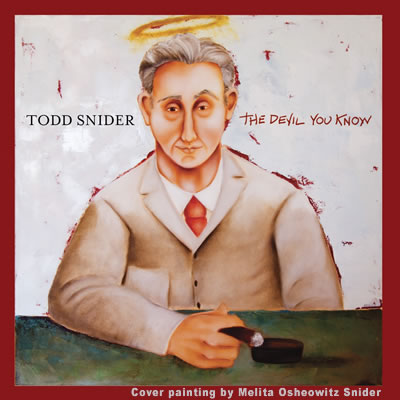
A Conversation with
Todd Snider
(continued)
PM: Is it fair to say that although this last great record, The Devil You Know, was 33 in the Rolling Stones Top 50, and 14 in Blender, and whatever it was in the twenties in No Depression, that after like eight or nine really well-received albums in all these years, you're still looking for that right audience and the support of the press in your hometown East Nashville? Is that the way it is?
TS: Well, I don't know how to answer that question, because I like it when people think that. My dad used to call me a "lunch money pimp." And I think it's true, man, because--
PM: [laughs]
TS: --it didn't take very much to make me satisfied when I started my music. I don't know what a rock star would necessarily feel like for sure, but I know the very first time I ever played and there was like three people in the audience and two of them were looking at the table and one guy clapped a little, man, I just thought, "Damn, I just nailed it at Carnegie Hall, and nobody is telling me different." [laughs]
PM: Wow.
TS: I don't know, it's like sometimes people will say, "Do you ever wish you had a bigger audience?" And I'm like, "God damn, did you just say I had an audience?" And it's like, "You're saying that I'm in music and I have an audience that could grow. God damn, so there's one person out there, right? Damn! I'm ready to do a rock band."
[laughter]
TS: I've always just been so grateful since the first time anybody ever gave me anything. I mean, I can't prove there's a God up there, but if there is, sometimes I'd really like to say, "God, man, thank you so much for letting me get to be a person that sings." But then I figure if I had God's attention for a minute I'd get pretty mad about all the other stuff. But I don't want to get on about God too much.

PM: Well, tell us, then, a little bit about your wife, Melita, whose painting is the great cover of The Devil You Know.
TS: Yeah. She's with me right now. Some of the places we play are like bars, but sometimes we play theaters, and on those nights of this tour, she's brought like 18 paintings, and we're doing a show for her stuff in the lobby before my show.
PM: Really?
TS: That's what I would like to travel around and do. I'd like to actually someday combine our stuff together into some kind of thing that we don't know what to call. But that's kind of pretentious, I guess. But it's still, if you're honest about it, it's a neat endeavor to think about--I mean, we travel to your town, and it costs you 15 bucks, and something is going to happen when we get there, but I can't tell you what it is.
PM: Wow. That's a really cool idea. I mean, there's got to be a way do that. It's part of the new emerging paradigm that has nothing to do with record companies that are all spiraling out of control. It has to do with little companies and DIY, and people saying, "Well, okay, my show is going to be like this now, because I said so."
TS: That's what I feel like. That's what I feel like, too. I feel like, gosh, you don't necessarily have to have a name for what you do anymore.
PM: Right. And then suppose you had a backdrop that was like fabricated of a whole collection of Melita's paintings.
TS: Yeah, that's what I'm thinking too, yeah. That's what I'm thinking, too. And like last night we did that, on the stage there was like five of her things. And we had like gypsy flags up everywhere, too.
PM: Wow.
TS: And then in the lobby there were some of her paintings last night.
PM: So how did you guys run into each other? Where did you meet your wife?
TS: I was in, well, drug rehab.
PM: Cool.
TS: Yeah, yeah. I try to say that--I try to just be blunt and say that. It's embarrassing. But I went in 1996, it was after my second tour, I just felt like I was drinking too much and taking too many drugs. So I went in there. And I'd been in there for about a week, a few days, I think, and I met her, and I felt like I pretty much knew that we were going to get married, pretty quick.
PM: Wow.
TS: And then we stayed together--we didn't make out and all that when we were at that place, because we knew we had stuff to do.
PM: Right.
TS: But I knew, like I said, "Well, when I get out of here, if I can keep my shit together, I'm going to find that girl." And I did. I went up to New York. When I was making my third record, I could mix it wherever I wanted to do. And I didn't know nothing about mixing. Fuck, I was like, "Yeah." "Where do you want to mix it?" I went, "Well, what difference does it make to me, man? I don't touch those buttons."
[laughter]
TS: But I thought, well, I want to go to New York. I found somebody that knew a studio in New York, and I made it out like I had to go use that place--
[laughter]
TS: --because that would put me up there in New York for two weeks. And I went and found her at her house, and I started dating her. And then I got her to move to my house in Nashville. This was like nine years ago. And we've been together ever since.
PM: That's an unbelievable story. You hear a lot of places--"Oh, I met my wife at so-and-so"--a party, at this or that. That's the first time ever somebody said, "Yeah, I met her in rehab."
TS: Rehab. It's funny, too, because it's like when you're sitting in a circle, that circle holding hands and they're making you recite poems about how much you want your life to be, you can't be any more humiliated. It's a good place to start.
PM: Yeah, you start out with somebody totally emotionally naked.
TS: Yeah. That was what I thought, too. I liked that.
print (pdf) listen to clips puremusic home